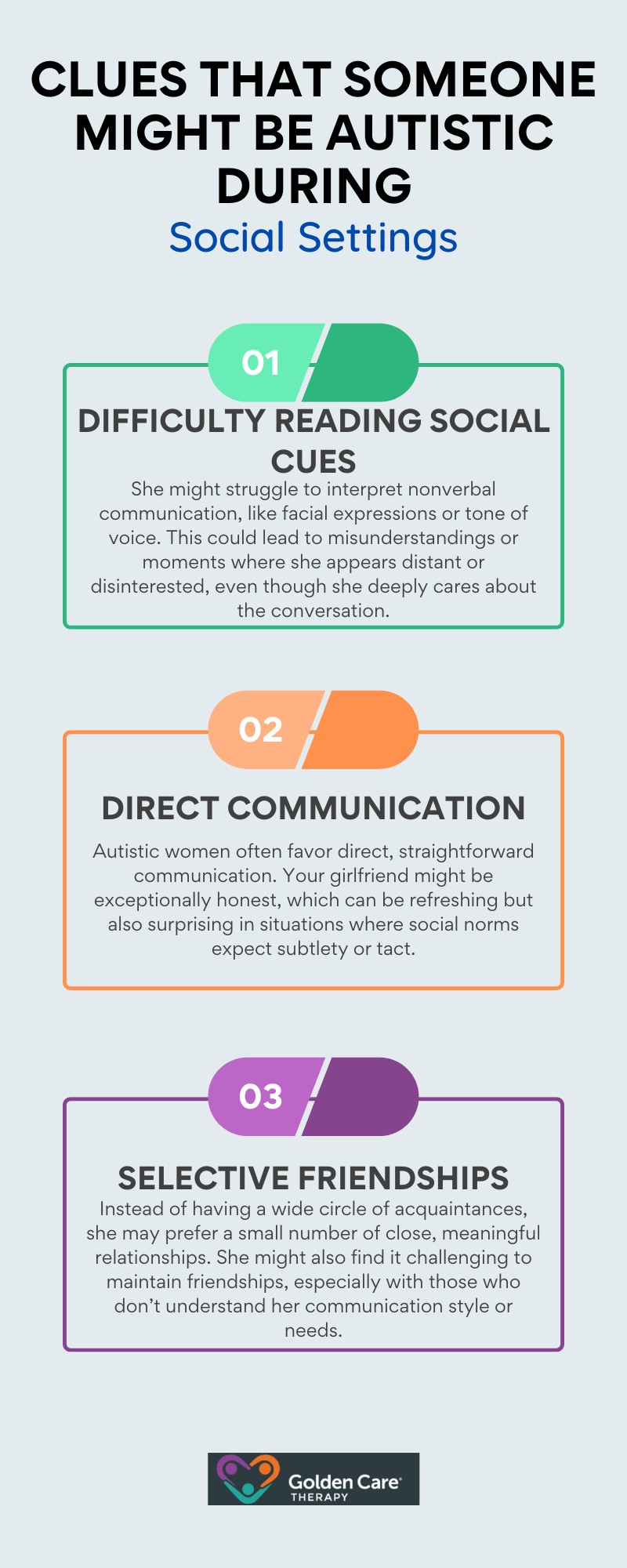Autism presents in diverse ways, often making it challenging to identify. When it comes to relationships, particularly romantic ones, spotting signs of autism in your girlfriend can be even more nuanced.
Women on the autism spectrum may exhibit behaviors or traits that differ from stereotypical expectations, as they often mask their symptoms or adapt to social norms in ways that make their autism less immediately apparent.
If you suspect your girlfriend might be on the spectrum, understanding these subtleties is key to fostering empathy and strengthening your relationship.
Understanding Autism in Women
Autism is often misunderstood as it pertains to women. Much of the research and diagnostic criteria have historically been based on male presentations of autism, which means that the ways women experience and express autism can go unnoticed. However, with increasing awareness, there is now more available support and programs tailored to recognizing and addressing the unique needs of women with autism.
Many autistic women develop strong coping mechanisms to navigate social environments, making their traits less visible. This ability to “mask” can lead to exhaustion and emotional struggles, which might not be apparent to those around them.
Here are some of the most common signs and symptoms to look out for in your girlfriend, along with an exploration of how they might manifest in everyday life.
Social Interaction and Communication
One of the hallmarks of autism is difficulty with social interaction and communication. While this might be more obvious in some individuals, your girlfriend may express this subtly.
For example, she might feel out of place in large social gatherings, seem overly focused on understanding social rules, or exhibit anxiety in group settings. Some clues to look for include:

Sensory Sensitivities
Autistic individuals often experience sensory sensitivities, and this can show up in various ways. Your girlfriend might have a heightened sensitivity to light, sound, textures, or even smells.
For example, she might avoid bright or noisy environments like crowded restaurants, preferring quieter, more controlled settings. Similarly, clothing tags, certain fabrics, or even temperature changes might be uncomfortable for her.
If she struggles with these issues, she may find relief in routines or environments where she has control over sensory input.
It’s also possible she has sensory-seeking behaviors. For instance, she might enjoy deep pressure (like hugs or weighted blankets), specific repetitive sounds, or tactile sensations that help her feel grounded.
Emotional Regulation
Emotional responses in autistic women can be intense and sometimes appear disproportionate to the situation. If your girlfriend is on the spectrum, she may experience heightened emotions or find it hard to regulate her feelings during stressful times.
If overwhelmed, she might have a “meltdown,” where emotions overflow, or a “shutdown,” where she withdraws completely. These are not tantrums or attempts to seek attention but rather responses to an overwhelming environment or situation.
She might also struggle to articulate how she feels or recognize her own emotions, a trait known as alexithymia. This can lead to frustration or confusion, particularly in emotionally charged situations.
While some people mistakenly assume that autistic individuals lack empathy, this is far from the truth. Many autistic women feel deeply for others but might express their empathy in nontraditional ways. Your girlfriend might be incredibly caring and supportive but show it through actions rather than words.
Interests and Routines
Another characteristic of autism is a strong attachment to routines and specific interests. Your girlfriend might have hobbies or passions that she pursues with remarkable focus and dedication.
These interests could range from art, literature, or animals to more niche or technical subjects. She may spend hours engrossed in her favorite activities and find immense joy in discussing them. While this focus can be inspiring, it might also seem all-consuming at times.
Autistic women often thrive on predictability. Your girlfriend might prefer to stick to a consistent schedule and feel stressed by sudden changes or uncertainty. This love of routine can extend to small habits, like eating the same meals or following a specific bedtime ritual.
Masking and Burnout
A significant reason why autism often goes undiagnosed in women is the tendency to “mask” symptoms. Masking involves mimicking social behaviors, suppressing natural tendencies, and trying to fit into societal expectations.
Your girlfriend might work hard to maintain appearances in public, smiling and engaging in conversation even when she feels uncomfortable. She may appear highly social and confident but feel drained afterward.
Over time, the effort to mask can lead to autistic burnout – a state of physical, emotional, and mental exhaustion. During burnout, she might withdraw, become less communicative, or struggle with daily tasks that normally wouldn’t be challenging.
Navigating the Relationship
Being in a relationship with an autistic person requires understanding and patience. If you notice traits that align with autism, it’s essential to approach the subject with care and respect.
Your girlfriend might already suspect she’s on the spectrum, or the idea could be entirely new to her. Either way, focusing on open communication and support is critical.
Instead of labeling her behaviors, express curiosity and ask how she feels about certain situations. Phrasing like, “I’ve noticed you seem uncomfortable in noisy places – how can I help?” is more supportive than jumping to conclusions.
Many traits associated with autism are strengths in their own right. Her honesty, dedication, and passion bring unique qualities to your relationship. Recognizing and valuing these attributes helps create a positive and affirming dynamic.
If your girlfriend feels comfortable, seeking a professional evaluation can provide clarity. A diagnosis (if she wants one) can open doors to resources and strategies that support her well-being.

Final Thoughts
Spotting signs of autism in your girlfriend is not about labeling her or trying to change who she is. It’s about understanding her experiences and providing the support and love she deserves.
Recognizing and embracing her unique traits can deepen your connection and help her feel seen and valued in your relationship.
While autism presents challenges, it also brings strengths and perspectives that enrich life. By fostering empathy, open communication, and patience, you can create a loving, supportive relationship that honors her individuality.
Whether or not she identifies as autistic, learning about her world will make you a better partner and friend. At Golden Care Therapy, we provide exceptional ABA therapy tailored to meet the unique needs of individuals and their families.
Our autism services in New York, New Jersey, Indiana, Georgia, and Florida are designed to foster growth, independence, and meaningful connections. Reach out to us today to discover how we can support you and your loved one.
Sources:



